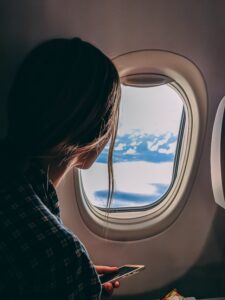There are many available super ways to stop travel anxiety, this article provides the core tips.
You’re about to embark on an anticipated trip, but rather than being excited, you can’t help but be nervous.
The prospect of being away from home for a long period of time is disturbing, and the thought of being in an unfamiliar environment surrounded by complete strangers makes your stomach turn.
My travel anxiety keeps me from enjoying vacations that are supposed to be relaxing, restorative, and enjoyable — and I know I’m not alone in this.
Don’t worry if you’re experiencing travel anxiety; you’re not alone.
In this article, we’ll look at what travel anxiety is, what causes it, and how to get rid of it.
What is travel anxiety?

Anxiety is a fearful feeling that develops when your body reacts to stress. It is characterized by nervousness, tension, and elevated blood pressure.
The fear of visiting an unfamiliar location is known as travel anxiety. It can also include the stress of planning your travels.
Even if you have no history of anxiety, the prospect of leaving familiar territory can cause you to feel nervous.
While it’s natural to be nervous about visiting new places, travel anxiety can be severe.
It can make vacations difficult and add stress to one’s life.
Travel anxiety can show up in a variety of ways.
Most individuals may exhibit physical symptoms such as a racing heart, sweating, or breathing difficulties.
Some may experience mental symptoms such as feeling stressed or out of control, concentration difficulties, or mood swings.
Some common symptoms of travel anxiety
Anxiety symptoms vary from person to person.
If your anxiety is related to travel, you may experience the following when traveling or thinking about traveling:
- sleeplessness
- inability to manage feelings of worry and concern about traveling
- reduced ability to focus
- feeling agitated or tensed in train stations or airports
- becoming easily irritated and impatient
- feelings of self-consciousness and of being judged by others
If these symptoms become too much, you may experience a panic attack.
Difficulty breathing, gasping for air, dry mouth, choking, fast heart rate, chest pain, sweating, muscle tension, shivering, and general weakness are all common symptoms of a panic attack.
Causes of travel anxiety
There isn’t likely to be a single cause of travel anxiety.
Many people suffer from travel anxiety throughout their lives.
Others may develop travel anxiety as a result of previous anxiety-provoking travel experiences, while others appear to have travel anxiety for no particular reason whatsoever.
It is essential to identify the source of your anxiety so that you can confront it.
Giving your anxiety a name may also help you manage and control your anxious feelings.
Most times it might be a cause of over considering the advantages and disadvantages of living abroad.
Consider what is causing your travel anxiety. Any of the following could be your answer.
1. Being uncomfortable as a result of being away from home

Some people become afraid of being away from home because it is their comfort zone.
An extreme form of this is agoraphobia, or the fear of public places. For instance, since their home has now become connected with safety.
The prospect of going away from home for a long period of time becomes really stressful.
2. Travel scary stories
Some individuals are moved by media stories.
Some people become anxious just by hearing about bad travel experiences, such as plane crashes or foreign diseases.
When you access news articles about criminal acts, injuries, abductions, and other disasters, you may not even realize you’re being influenced.
This can have an effect on your mental health, and you may begin to link travel with tragedy.
3. Worries during the trip
You may not have had travel anxiety prior to your trip, but you may develop it during it.
This could be caused by a variety of factors, such as the specifics of your accommodation once you arrive.
Also, the potential uneasiness of being in a new place.
There are also questions about how you’ll get to places you need to visit, such as supermarkets or shopping malls, or a lack of funds that will last you the duration of your travel.
4. Flight phobia

Fear of flying is probably the most common concern seen in people suffering from travel anxiety.
This fear could be prompted by: air turbulence, fear of crashing, or the thought of flying miles well above the earth.
Even if you know that flying is statistically safe, you may experience these feelings.
If you identify with any of the above, don’t fret; there are ways to ease travel anxiety and make traveling more pleasurable. Let’s look at some pointers.
1. Try to figure out what makes you anxious

Anxiety triggers are events that cause your anxiety symptoms to worsen.
These triggers can be travel-specific, such as planning a trip or boarding a plane.
For example, if looking out the window during take-off causes you anxiety, try closing the window covering to avoid doing so.
If having to listen to the safety briefing makes you paranoid, try wearing earbuds or reading a book during that time.
External factors such as low blood sugar, caffeine, or stress may also be present.
When you feel travel anxiety, write down what is going through your mind. Understanding your fears allows you to evaluate them.
2. Carry out your own research
Another excellent method or one of the great ways to stop travel anxiety for easing travel anxiety is to plan ahead of time.
Because of your research, you can be confident in your destination.
Knowing what to expect on a trip reduces the likelihood of uncertainties or shocks.
Before you travel, do a lot of research on your destination.
Establish what you want to do while you’re in the location.
Read reviews and speak with previous people who visit.
3. Change your perception

It may also be beneficial to change your perspective on travel.
For example, choosing to focus on the upsides of your travel may provide a feeling of relief.
Shift your focus from what you’re concerned about to what you’re excited about.
Before your trip, make a list of all the good experiences you hope to have.
Keep this list with you on your trip and refer to it in times of anxiety.
To calm your thoughts, use a positive affirmation such as ‘I am safe.’ This is a great way to be hopeful about the future.
4. Speak with somebody
It’s essential to talk to someone if you’re dealing with anxiety or being overwhelmed while away, this is among the excellent ways to stop travel anxiety.
Consider speaking to the person next to you if you’re nervous about flying.
They might be able to understand how you’re feeling and offer some advice.
You can also call a loved one or travel with someone who will be supportive, hear your worries or fears, and let them know what you need to feel less anxious.
If you do not want to contact friends or family, speaking with a therapist may be valuable. A therapist can assist you in understanding and managing your anxiety.
Also Read : 9 Ways to Find Hope When Depressed.
Conclusion
In addition to these ways to stop travel anxiety, you should strive to reduce your overall anxiety as regards approach to life.
Anxiety is a serious condition that needs not to be ignored.
When you experience anxiety in one area of your life, it can lead to increased anxiety in other areas of your life.
I strongly advise that if you experience anxiety on a regular basis, you should seek medical advice.